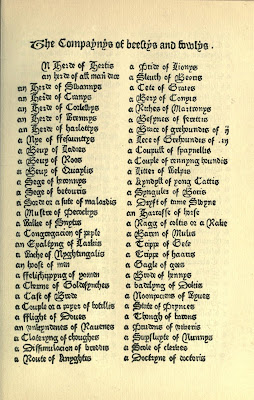The next time someone says "did you know the collective noun for ducks is 'a paddling'" tell them they're perpetuating old twaddle.
Obscure collective nouns come from medieval 'terms of venery' - mostly never used, and often just courtly in-jokes.
Six-hundred years later, they're fodder for trivia quizzes everywhere, but they're really not 'true' in any real sense, even though a few have actually caught on because of the frequency with which the myth that they were the 'proper' terms has been perpetuated.
The most common source for the many bogus collective nouns is the 'Book of St Albans', a 15th century book of advice on tedious aristocratic interests like hunting and heraldry. But in amongst the 'murder of crows', 'charm of goldfinches' and (best known of all) 'pride of lions' are a 'herd of harlots', a 'blush of boys' and a 'disworship of Scots'.
Perhaps most telling is the collective noun for a pardoner ... something that will make perfect sense to anybody familiar with Chaucer's Pardoner's Tale: "a lying of pardoners". Clearly many of these terms were never meant to be taken remotely seriously.
The absolute clincher, if it's needed, that nobody was every expected to use these terms in anger, comes from the collective noun for monks, according to the Book of St Albans:
"A bominable sight of monks". By the groan-inducing standards of medieval humour, that's actually not bad.
The pages from the Book of St Albans concerned are below:



No comments:
Post a Comment